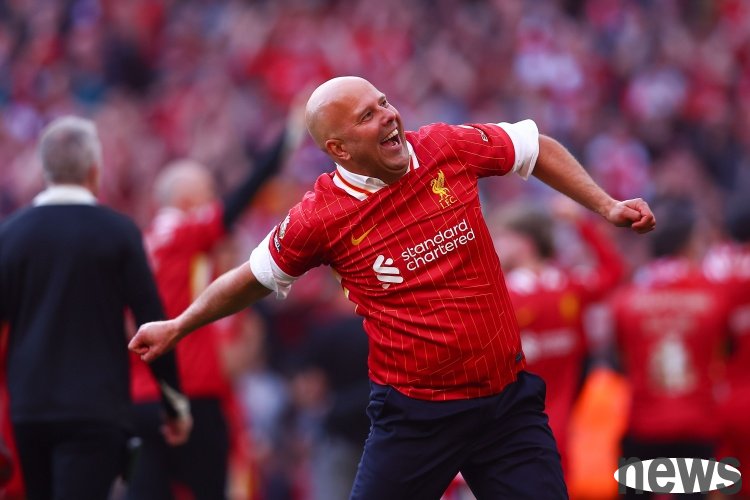
Liverpool is definitely the most eye-catching presence in the transfer market this summer, not only because of their spending a lot of money, but also because of their savvy when selling players. The Athletic author Gregg Evans talks about this topic.
Thinking back then, judging whether a team's performance during the transfer period was only based on the quality of the signings, but in the "new era" of profit and sustainable development rules, the club's ability to sell people is also crucial.
At this point, perhaps Liverpool and Manchester City can be regarded as the two Premier League players. As the defending champion, Liverpool recovered £194 million by selling players this summer, providing strong support for their £419 million signings in the summer window. In contrast, Manchester United did not clear the "bomb squad" until the last moment of closing the window, and Arsenal was far more difficult to sell people than to buy people.
In fact, only Chelsea and Bournemouth earn more this summer by selling people.
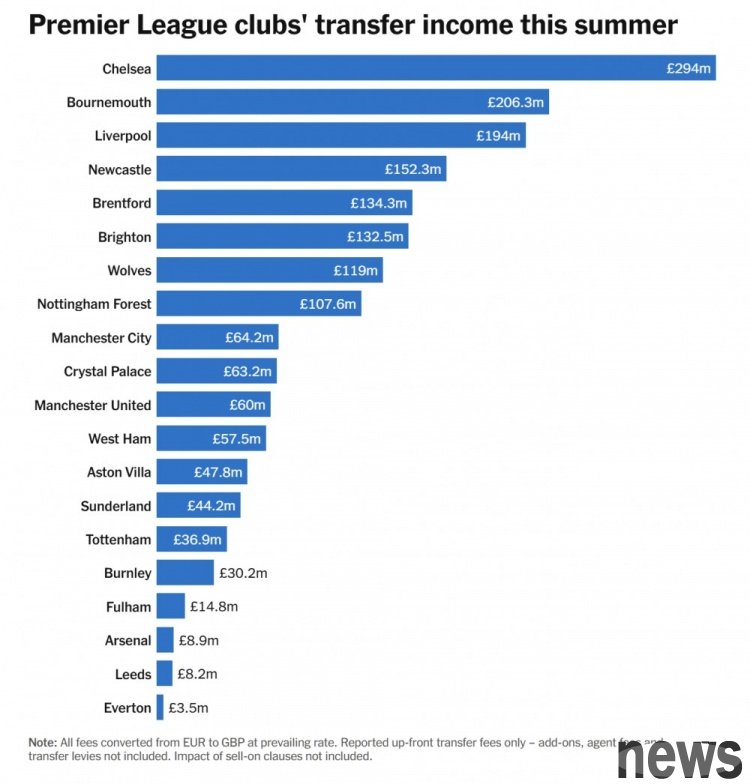
Only Chelsea and Bournemouth have earned more sellers in the Premier League this summer than Liverpool
It is true that Saudi financial backers have helped Liverpool recently. Riyadh Crescent spent 53 million euros for Nunes, which is more generous than any European club. Previously, Henderson and Fabinho also went to Saudi Arabia at a high price, but Liverpool's real strength is "paying money" from other European top league teams. In the transfer market, Liverpool can always stick to the psychological price. Diaz, Nunes and Kellech are all sold at high prices this summer, while young players Kanssa, Elliott, Ben Dock and Morton have also made huge profits for the team.
Although Arnold, who was determined to go to Madrid to watch Real Madrid play close, did not leave Liverpool with too much reward, the 8.4 million pounds paid by Real Madrid to allow Arnold to play in the Club World Cup is considered better than nothing.
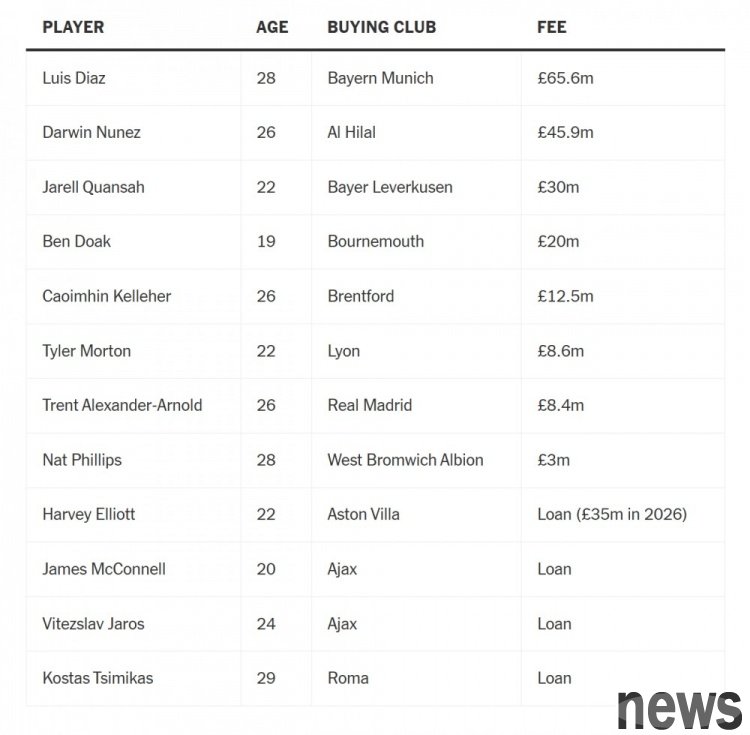
This summer, 12 Liverpool players left the team in the form of transfer or loan, and exchanged for 194 million pounds
. These are the core secrets of Liverpool's sales strategy and the reason why their sales record is so amazing.
Speaking of which, there has been a foreshadowing of Liverpool's salesman.
In March 2024, Edwards returned to Fenway Group as the CEO of football. His best attitude is to sell people at high prices: in 2018, he sold Coutinho to Barcelona for 142 million pounds, which was his famous work, and players such as Ibi, Brad Smith, Kevin Stewart, Danny Ward, Sarco, Brewster, Harry Wilson and Nico Williams were also sold at high prices by him. Moreover, the departure of these players did not make fans regret for too long, and Liverpool used the funds they left to form the championship team under Klopp.
Although Edwards no longer "fights on the front line" after returning to Liverpool, Richard Hughes, who is now in front of the stage, is also his direct line. The new sports director earned about £290 million for the club in three transfer windows, continuing his brilliant sales record at Bournemouth. Previously at Bournemouth, Hughes signed Solank, Nathan Aker, Ramsdale, Timmins and Danjuma for the team, and all ended up selling for good prices. After he left, Zabarney, Ouattara and Kolkz (both signed by Hughes) also left the team at a high price - the last one came to Liverpool.
Although the operating markets are different, Hughes's operating ideas in the two clubs are in line with each other. Ben Dock's transfer is a good example: the 19-year-old winger, signed by £600,000 in 2022, has only played three Premier League games at Liverpool, but the club is aware of his market value - they rejected offers from Crystal Palace and Ipswich last season. Hughes received calls from several clubs this summer, including Nottingham Forest, who wanted to loan, but Liverpool insisted on accepting only permanent transfers. The club even prepared to retain Dok as a rotation, and this calm attitude (even if not intentional) pushed up the price.
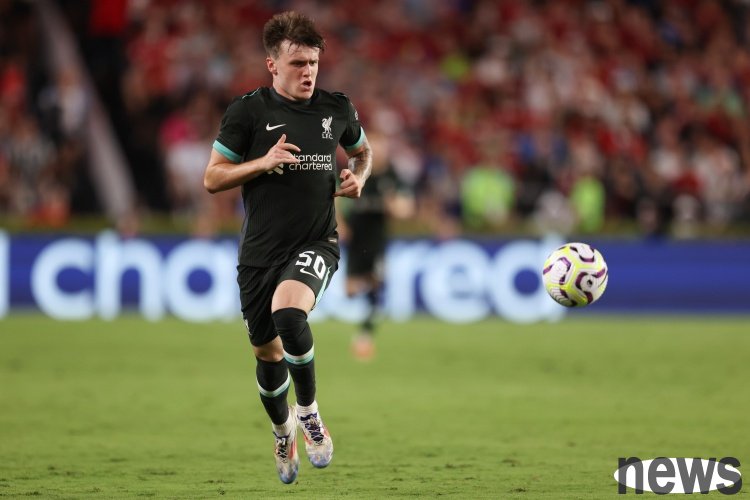
When Bournemouth's offer reached £20 million (up to £25 million), Liverpool was satisfied and decided to let the person go - but added a buyback clause. If Bomb Dock is kicked out, the club can still take the initiative. Liverpool's "fine management" of Ben Dock (including the successful loan of Middlesbrough last season) also helped them gain advantage in the negotiations.
All Liverpool's loans are strategically planned: whether the style matches, how the opponent's club used to use loan players, how many games can be played, and what the growth environment is, we must consider. The club will even send people to the potential next home to inspect hardware, and will also visit players during the season. For example, in December last year, Edwards and Fenway technical director Julian Ward made a special trip to Miburg to see Ben Dock.
An anonymous player agent said: "The most powerful thing about Verpool is to enhance the value of players, which is reassuring. "
Fenway has always implemented a self-sufficiency model, and the club management structure is also clear: Edwards reported to Fenway's board of directors, Hughes reported to Edwards, and Slott (Liverpool's first "head coach") reported to Hughes. During the transfer window, Edwards and Hughes had to make several calls every day to talk about signings, selling people and contract negotiations.
The degree to which the senior team participates in sales depends on the size and complexity of the transaction. Slot's role is different from before in Alkmaar and Feyenoord - at that time it was normal for core players to be poached by giants, but there was no such pressure in Anfield. As long as he wants to keep people, the chances are much greater. But after all, if the team's financial and health issues are involved, there is nothing that cannot be "compromised" - Dias's transfer is the best example.
Slott likes Dias very much. For most of the summer, Liverpool executives insisted that the 28-year-old Colombia winger was not a seller: they put down Saudi Arabia's offer, rejected Barcelona's purchase, and told Bayern not to sell people through Hughes.. But because Dias wanted to leave after several extensions of the meeting, when Bayern's offer raised 75 million euros (the third highest transfer fee in team history), Liverpool could only let go. The data team calculated that only 7 players over 28 years old had higher transfer fees than this, and the club felt that this was not a loss - especially considering the joining of Werz and Ekitic, Ngumoha's emergence, and long-term attention to Isaac.
Bayern certainly knows how strong Dias is, so they are willing to pay such a high transfer fee. But for Liverpool, it is not worth mentioning to sell the main player at a high price. After all, they are marginal players who can sell at high prices - it is these transactions that add up to make Liverpool beat Liverpool in the transfer market this summer.
Last year, Van Denberg and Fabi Carvalho, two substitutes, sold a total of up to 52.5 million pounds to Brentford. Van Denberg has never even played in the Premier League, and Carvalho has only made 13 appearances.
Vandenberg's deal was particularly difficult. Even the Dutch defender himself felt that the price was too high. In the US preseason last July, he told reporters: "If you want to leave the team, 20 million pounds is indeed a bit exaggerated. My first reaction is that the price is really high! But it is also a kind of recognition. "
Although Brentford did not want to pay 20 million pounds at the beginning (plus 5 million float), Hughes took out a lot of data to prove that similar defenders are at this price. This is another example of Liverpool cleverly using loans to enhance the value of players: Van Denberg played well in Mainz, Bundesliga in 2023/24.
Huces' prestige in the industry can be seen from repeated transactions: the mutual trust established with Brentford has led to Kellech's transfer this summer (up to £18 million). Although Kellech only has one year left for the contract, the deal is still cost-effective - after all, the club has signed Mamadashvili to serve as a substitute for Alisson.
Leverkusen and Hughes have a good relationship - he and CEO Rollfies have had a good conversation during the transfer negotiations of Werz. Both parties are tacit about the transaction structure: Wilz's transfer fee cannot exceed Fenway's budget, but Rollfies also has to prove to the board that it is not a loss to let the core players go. Although Kanssa's transfer has nothing to do with Wirtz, it has been talked about for a long time. Liverpool once again talks about the valuation of other central defenders (including Everton's Branswaite - Manchester United's offer as high as £43 million last summer), especially Kuanssa is fast-forwarding the Three Lions. The final transaction structure became the key: the buyback clause made Leverkusen suppress the price, and it also made it reasonable for Liverpool to let the semi-main player go.
Eliott is similar to renting Villa on buzzer-bearing (forced buyout after 10 appearances). Liverpool initially priced £50 million for the 22-year-old midfielder, and finally released the total price of £35 million (including repurchase and secondary share terms). With the arrival of Isaac, Ekitic, Wilz and Flynnon, his playing space has been compressed. Liverpool feels that he can still gain some benefits in the future by sending Premier League powerhouses to level up and increase their value.
Opportune clubs all know what it feels like to deal with Liverpool: Edwards has a well-known reputation in the industry, and Hughes was familiar with many top agents during his time at Bournemouth. Many player representatives use similar words to describe Hughes: "diligent" and "understand the market", and some people say that he is "just" and "easy to talk", but he is never soft when he should be hard.
Former Liverpool Youth Training Recruitment Manager and Loan Management Matt Newbury is now the global talent director, responsible for planning loan paths for players to facilitate high prices in the future.
Not all decisions are so easy. Hughes made some adventurous tough decisions—such as refusing Leverkusen to loan Morton last season. When Liverpool missed Suvimenti, the club decided to allow Morton to transfer forever, otherwise it would be kept as a substitute. Lyon paid £8.6 million (up to 13 million) to sign him this summer.
Also Hughes, last year, was not allowed to leave goalkeeper Vitzlav Yaros because he was worried about Allison's injury. Yaros, who just won the double championship with Graz Storm, wanted to play time, but staying in the team allowed him to play two goals when Alison was injured for two months. The club not only maintained the players' enthusiasm and attracted the attention of other teams by explaining the plan in detail and promising to release them this summer.
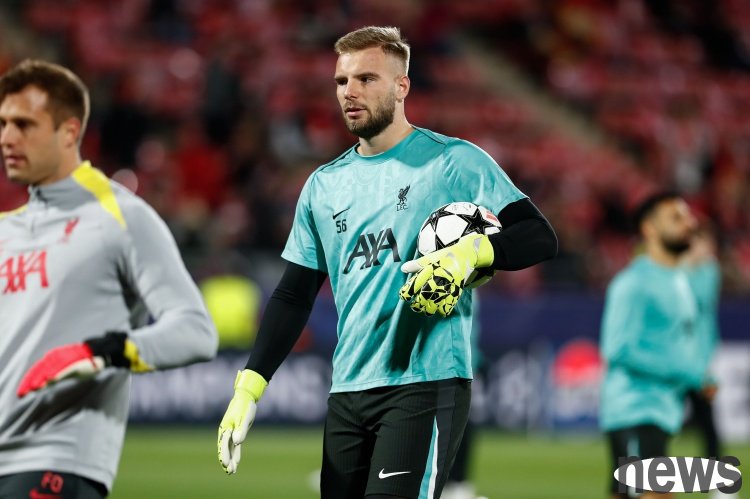
24-year-old Jaros has joined Ajax on loan, and may become the next youth training product to sell at a high price - Lewis Kumas. The 19-year-old striker was rented to Birmingham (no buyout clause was set), and Liverpool thinks it would be more valuable if they play well.
Liverpool could have sold James McConnell, Irving Baker and Luca Stephenson, but the club insisted on not giving up on valuation and refused to sell at a low price. In the end, all three left the team on loan.
It is this long-term strategy that has now produced results. Only Chelsea and Bournemouth have higher revenue than Liverpool this summer, but many of the former's transactions are actually a loss, while the latter weakens the main lineup. Other giants can only be jealous of Liverpool's ability to realize their talents - especially Arsenal: the highest price in team history was still the £35 million that Chamberlain went to Liverpool in 2017, while Liverpool sold 7 more expensive in the same period.
Premier League champions may prove that the lineup will be stronger if they change blood. As funds continue to flow back, the club's account books are also particularly healthy.
